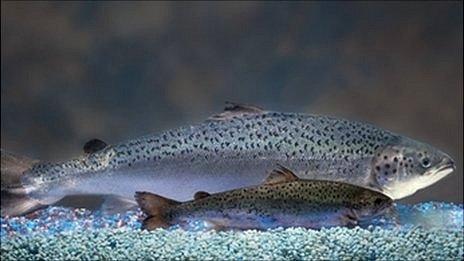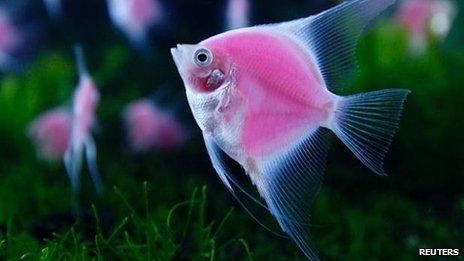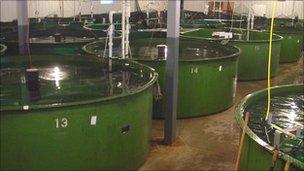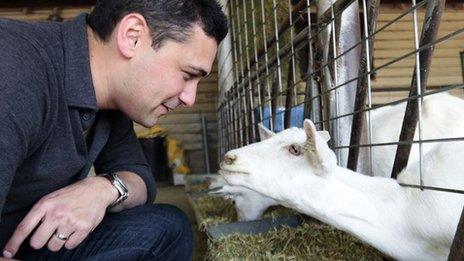Salmon steak from GM fish could soon be on your plate
- Published

Comparison of GM salmon and a non-GM salmon (foreground) of the same age
Biologists believe they are on the cusp of producing the first genetically modified fish fit for human consumption. But what effects might it have on the world's ecosystems?
Sitting by a tiny ice hole on Prince Edward Island in Canada, Joey Gauthier suddenly jolts forward.
His rod dips. Seconds later, a fish emerges from the depths of the freezing waters below.
"Gotcha!" shouts the fisherman, as he puts the catch in a bucket.
What Mr Gauthier does not know is that not far away, bigger fish are in the making.
US biotechnology firm AquaBounty is at work in Canada harvesting eggs from genetically modified Atlantic salmon. Once grown (in onshore tanks based far away in Panama) the AquAdvantage salmon will look like their natural cousins, but reach full size in half the time.

AquaBounty has been working for 17 years to get approval for the fish to reach your dinner table. Now it's getting close.
The US food regulator, the Food and Drug Administration (FDA), has just declared that transgenic AquAdvantage salmon have "no significant impact", which is usually the last step before the final approval.
If it comes, the salmon will become the first genetically modified (GM) animal approved for human consumption.
There is still a brief period to voice objections, but Dr David Edwards of the Biotechnology Industry Organization is certain of the outcome: "From my read of the review it looks like it should be approved."
The AquAdvantage salmon, reared from the eggs of wild Atlantic salmon, sports some extra genes from the Pacific Chinook salmon and an eel, the ocean pout. Together they make the fish grow faster and all-year round.
As with all GM animal research, there are concerns. The Atlantic Salmon Federation, for example, fears the fish could get into the wild, start breeding and disturb the ecosystem.
According to Aqua Bounty, the engineered salmon are all female, sterile, and raised in physically contained facilities, so the chance of the fish breeding in the wild is negligible.
While AquaBounty was waiting for FDA approval, other researchers around the world have been tinkering with animals' genes, to produce food, medicines, materials, improve livestock or create better pets.
Four years ago, the FDA approved the first human biological drug produced from a transgenic animal, a goat.
There are also transgenic cows with human genes that produce milk similar to human breast milk and GM goats that produce a protein in their milk that can be spun into a spider silk thread.
Glowing fish
One GM animal that has made it into many homes is the fluorescent fish.
It was first produced more than a decade ago by scientists in Singapore and Taiwan. The plan was to insert a natural fluorescence gene from a sea coral into fish embryos - and the fish were to glow in the presence of environmental toxins, to detect pollution.
But Taiwanese company Taikong Corp quickly spotted the market opportunity and began to sell glowing medoka fish for use in aquariums - Taiwan was first to approve the sale of GM animals as pets.
A US-based firm partnered with the Singaporean researchers to market GloFish - fluorescent zebrafish.
The firm's founder Alan Blake says that there has been huge interest from consumers.

Taiwan first authorised the sale of a GM animal as a pet
"The fish are sold everywhere - people love them. We've now got a variety of different colours - red, green, orange, blue, purple - and besides zebrafish, we also sell fluorescent tetras and tiger barbs," he says.
Even though it's been some time since the fish was created, no other genetically modified pets have appeared on the market.
"Ten years ago, people were saying that selling fluorescent fish was going to open the door to who knows what, but it hasn't," says Mr Blake.
"Here we are 10 years later, and although there are GM animals [including cats] with fluorescent genes for medical purposes, for instance to detect cancer, I don't anticipate that we will see fluorescent cats, dogs and other pets - and whether people would want them."

Transgenic salmon are grown in outdoor ponds or in large tanks
Although there have been attempts to create hypoallergenic cats, so far there has not been much proof the research has been successful, adds Mr Blake.
Disease-resistant pets
Instead, biotech firms could pursue making pets resistant to diseases, he predicts.
In agriculture, this is already happening. It's driven by economics. In the UK alone, the cost of livestock contracting infectious diseases has been £15bn over the past 10 years, says Prof Bruce Whitelaw of the Roslin Institute, based in Edinburgh and famous for cloning Dolly the sheep.
Vaccination is the main defence against infectious disease, but for some diseases this does not work.
"There's considerable scientific research into animal disease and leading this effort is research into animal genetics, and huge advances have been achieved recently," says Prof Whitelaw.
There are projects to develop chickens that do not transmit bird flu, pigs that are resistant to African swine fever and cattle that can't catch African sleeping sickness.
The UK Department for Environment, Food and Rural Affairs (Defra) believes that GM could indeed help tackle global challenges such as food security, climate change and sustainability of agriculture, but insists that safeguarding human health will always take "top priority".

GM goats at Utah State University, US, produce spider silk protein in their milk
Animal rights group Peta, however, says that "genetic modification only contributes to the cruelty already inflicted on animals raised for food and used in experimentation".
Back home on Prince Edward Island, Joey Gauthier says: "So, they're genetically engineering fish now, huh - I don't think I like the idea, because what will the fisherman do if all the fish is made in a lab?
"On the other hand, if it were to get out of the inland tanks and into the wild, I guess I wouldn't even know it's not a real Atlantic salmon.
"I would just be happy I've caught a big fish!"
- Published2 October 2012
- Published4 January 2011
- Published13 January 2011
- Published12 September 2011
- Published27 September 2010
- Published27 July 2010